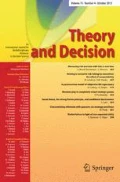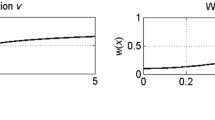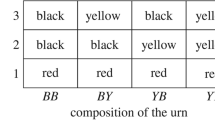Abstract
This paper provides new foundations for Bayesian Decision Theory based on a representation theorem for preferences defined on a set of prospects containing both factual and conditional possibilities. This use of a rich set of prospects not only provides a framework within which the main theoretical claims of Savage, Ramsey, Jeffrey and others can be stated and compared, but also allows for the postulation of an extended Bayesian model of rational belief and desire from which they can be derived as special cases. The main theorem of the paper establishes the existence of a such a Bayesian representation of preferences over conditional prospects, i.e. the existence of a pair of real-valued functions respectively measuring the agent’s degrees of belief and desire and which satisfy the postulated rationality conditions on partial belief and desire. The representation of partial belief is shown to be unique and that of partial desire, unique up to a linear transformation.
Similar content being viewed by others
References
Adams E. (1975) The Logic of Conditionals. Cambridge University Press, Cambridge
Anscombe F.J., Aumann R.J. (1963) A definition of subjective probability. Annals of Mathematical Statistics 34: 199–205
Bolker E. (1966) Functions resembling quotients of measures. Transactions of the American Mathematical Society 124: 292–312
Bolker E. (1967) A simultaneous axiomatisation of utility and subjective probability. Philosophy of Science 34: 333–340
Bradley R. (1998) A representation theorem for a decision theory with conditionals. Synthese 116: 187–229
Bradley R.W. (1999a) More triviality. Journal of Philosophical Logic 28: 128–138
Bradley R. (1999b) Conditional desirability. Theory and Decision 47: 23–55
Bradley R. (2001) Ramsey and the measurement of belief. In: Corfield D., Williamson J (eds) Foundations of Bayesianism. Kluwer Academic Press, Dordrecht, pp. 273–299
Bradley R. (2004) Ramsey’s representation Theorem. Dialectica 58: 483–498
Broome J. (1991) Weighing Goods. Basil Blackwell, Oxford
De Finetti B. (1937) La Prévision: ses lois logiques, ses sources subjectives. Annales de l’Institut Henri Poincaré 7: 1–38
Döring F.E. (1994) Probabilities of conditionals. The Philosophical Review 103: 689–700
Dreze, J. and Rustichini, A. (2003), State-dependent utility theory, in Barbera, S., Hammond, P. and Seidl, C. (eds.), Handbook of Utility Theory, Vol 2, Chapter 16, Kluwer Academic Press, Dordrecht.
Edgington D. (1991) Do conditionals have truth-conditions?. In: Jackson F. (eds). Conditionals. Oxford University Press, Oxford, pp. 176–201
Fishburn P.C. (1973) A mixture-set axiomatisation of conditional subjective expected utility. Econometrica 41: 1–25
Hajek A. (1989) Probabilities of conditionals – revisited. Journal of Philosophical Logic 18: 423–428
Jeffrey R.C. (1983) The Logic of Decision, 2nd ed. University of Chicago Press, Chicago
Joyce J. (1999) The Foundations of Causal Decision Theory. Cambridge University Press, Cambridge
Krantz, D.H., Luce, R.D. Suppes, P. and Tversky, A. (1971), Foundations of Measurement, Vol 1, Academic Press.
Lewis, D.K. (1973), Counterfactuals, Blackwell Publishers.
Lewis D.K. (1976) Probabilities of conditionals and conditional probabilities. Philosophical Review 85: 297–315
Luce R.D., Krantz D.H. (1971) Conditional expected utility. Econometrica 39: 253–271
McGee V. (1989) Conditional Probabilities and Compounds of Conditionals. Philosophical Review 48: 485–541
Over D.E., Evans J.St.B.T. (2003) The probability of conditionals: the psychological evidence. Mind & Language 18: 340–358
Ramsey F.P. (1926) Truth and probability. In: Mellor D.H. (eds). Philosophical Papers. Cambridge University Press, Cambridge
Savage L.J. (1972) The Foundations of Statistics, 2nd ed. Dover, New York
Stalnaker R.C. (1970) Probability and conditionals. Philosophy of Science 37: 64–80
Author information
Authors and Affiliations
Corresponding author
Rights and permissions
About this article
Cite this article
Bradley, R. A Unified Bayesian Decision Theory. Theor Decis 63, 233–263 (2007). https://doi.org/10.1007/s11238-007-9029-3
Received:
Accepted:
Published:
Issue Date:
DOI: https://doi.org/10.1007/s11238-007-9029-3




